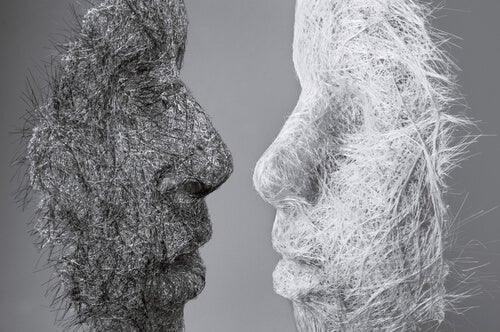The Drama Triangle: Victim, Persecutor, Rescuer

Psychologist Stephen Karpman came up with the theory that in human relationships that lack authenticity, you’ll often see mechanisms that he called “control games”. Part of those games involves the idea that people basically adopt three roles, or attitudes: the victim, the persecutor, and the savior. This is the drama triangle.
Before you start to over-analyze your life, remember that this only goes for relationships that lack authenticity. There’s no bond based in the truth. It’s entirely the opposite; everyone involved is playing their own “control game”.

Definitions of victim, persecutor, and savior
Each one of these roles, according to Karpman, has some basic, defining characteristics. In other words, a victim, persecutor, or savior, will tend to behave in roughly the same way as anyone else in a similar role. But that doesn’t necessarily mean people can’t swap interchangeably between roles. Here are the characteristics of each role in the drama triangle.
Victim
The people who we classify as victims in this context are those who take an attitude of helplessness. They don’t know things, can’t do things, or can’t achieve things. They always want other people to help and support them, but will never stop complaining about their situation. People in this role put their responsibilities on other people’s shoulders.
Persecutor
The persecutor is the person who keeps to themselves, on the outside of any situation. At least that’s how it might seem. What defines a persecutor is that they judge others, with extreme severity. They point out everyone else’s mistakes and seem to enjoy the emotional distress they cause other people.
Savior
These are the people in a drama triangle who put other people’s responsibilities and problems on their own shoulders. But the help they offer isn’t authentic. It doesn’t help the other person grow. Instead, it just leads that person to become even more dependent.
The drama triangle at work
Victim, persecutor, and savior are all masks with different facets, but they’re all manipulative in their own ways. For example, a victim might manipulate other people and take advantage of them through their supposed helplessness.
At the same time, though, they’re also feeding their own feelings of low self-worth and deep insecurity. They think that because they aren’t able to do things, they deserve unconditional understanding. These people can easily become abusers or persecutors.
As for persecutors, they’ll throw their own frustrations onto other people. They want other people to give them some authority or importance, and try to achieve that by becoming judge and jury. They learn to stand out through their cruelty and intimidation. But when it comes to truly facing their fears, they’re generally cowards.
Saviors, who you might think are the most positive force in the drama triangle, need to feel needed. However, the help they give isn’t selfless. Like the victim, they feel insignificant and want other people to depend on them to feel seen, or to earn people’s affection. At the same time, they may complain about feeling exploited. They often move into the role of victim.

Getting out of the control games in a drama triangle
Even though these “games” being played by a victim, persecutor, and savior, tend to become ingrained in the fabric of their relationship, it’s possible to get out of these structures. One of the most obvious ways to do that is to be honest with yourself and truly make an effort to create genuine bonds with other people.
There are some concrete ways to move away from these three roles and into healthier attitudes. Here’s a few, just to give you an idea:
Saviors
Saviors need to try to help in an empathetic way. The point isn’t to take other people’s burdens on your shoulders. The goal is to be able to see their problems and what they need and to help that person overcome things on their own. They should gain independence and confidence, not lose it.
Persecutors
Persecutors need to create a more assertive environment. A persecutor needs to stop focusing so much on other people and focus more on themself. If they have even a bit of an assertive personality, they may seem very independent. They may know how to set boundaries, but the problem is that they don’t respect other people’s.
Victims
Victims need to take responsibility for themselves. Instead of waiting to be rescued, they need to focus on truly understanding their capabilities and what they can do. Maybe they’ll still need help sometimes, but the goal is to not ask for it in an unlimited, unconditional way. They need to learn to help themselves.
These three roles are part of Karpman’s drama triangle. It’s a triangle because all three of its points (victim, persecutor, and savior), have an inseparable bond. They can’t exist without each other.
In some cases, people will even move onto a new role. The victim becomes the persecutor, the persecutor becomes the savior, the savior becomes the persecutor, and on and on in a neverending cycle. That’s what makes it so important to break out of these structures if you feel you’ve been caught in them. Figure out your role and take steps to grow out of it!
Psychologist Stephen Karpman came up with the theory that in human relationships that lack authenticity, you’ll often see mechanisms that he called “control games”. Part of those games involves the idea that people basically adopt three roles, or attitudes: the victim, the persecutor, and the savior. This is the drama triangle.
Before you start to over-analyze your life, remember that this only goes for relationships that lack authenticity. There’s no bond based in the truth. It’s entirely the opposite; everyone involved is playing their own “control game”.

Definitions of victim, persecutor, and savior
Each one of these roles, according to Karpman, has some basic, defining characteristics. In other words, a victim, persecutor, or savior, will tend to behave in roughly the same way as anyone else in a similar role. But that doesn’t necessarily mean people can’t swap interchangeably between roles. Here are the characteristics of each role in the drama triangle.
Victim
The people who we classify as victims in this context are those who take an attitude of helplessness. They don’t know things, can’t do things, or can’t achieve things. They always want other people to help and support them, but will never stop complaining about their situation. People in this role put their responsibilities on other people’s shoulders.
Persecutor
The persecutor is the person who keeps to themselves, on the outside of any situation. At least that’s how it might seem. What defines a persecutor is that they judge others, with extreme severity. They point out everyone else’s mistakes and seem to enjoy the emotional distress they cause other people.
Savior
These are the people in a drama triangle who put other people’s responsibilities and problems on their own shoulders. But the help they offer isn’t authentic. It doesn’t help the other person grow. Instead, it just leads that person to become even more dependent.
The drama triangle at work
Victim, persecutor, and savior are all masks with different facets, but they’re all manipulative in their own ways. For example, a victim might manipulate other people and take advantage of them through their supposed helplessness.
At the same time, though, they’re also feeding their own feelings of low self-worth and deep insecurity. They think that because they aren’t able to do things, they deserve unconditional understanding. These people can easily become abusers or persecutors.
As for persecutors, they’ll throw their own frustrations onto other people. They want other people to give them some authority or importance, and try to achieve that by becoming judge and jury. They learn to stand out through their cruelty and intimidation. But when it comes to truly facing their fears, they’re generally cowards.
Saviors, who you might think are the most positive force in the drama triangle, need to feel needed. However, the help they give isn’t selfless. Like the victim, they feel insignificant and want other people to depend on them to feel seen, or to earn people’s affection. At the same time, they may complain about feeling exploited. They often move into the role of victim.

Getting out of the control games in a drama triangle
Even though these “games” being played by a victim, persecutor, and savior, tend to become ingrained in the fabric of their relationship, it’s possible to get out of these structures. One of the most obvious ways to do that is to be honest with yourself and truly make an effort to create genuine bonds with other people.
There are some concrete ways to move away from these three roles and into healthier attitudes. Here’s a few, just to give you an idea:
Saviors
Saviors need to try to help in an empathetic way. The point isn’t to take other people’s burdens on your shoulders. The goal is to be able to see their problems and what they need and to help that person overcome things on their own. They should gain independence and confidence, not lose it.
Persecutors
Persecutors need to create a more assertive environment. A persecutor needs to stop focusing so much on other people and focus more on themself. If they have even a bit of an assertive personality, they may seem very independent. They may know how to set boundaries, but the problem is that they don’t respect other people’s.
Victims
Victims need to take responsibility for themselves. Instead of waiting to be rescued, they need to focus on truly understanding their capabilities and what they can do. Maybe they’ll still need help sometimes, but the goal is to not ask for it in an unlimited, unconditional way. They need to learn to help themselves.
These three roles are part of Karpman’s drama triangle. It’s a triangle because all three of its points (victim, persecutor, and savior), have an inseparable bond. They can’t exist without each other.
In some cases, people will even move onto a new role. The victim becomes the persecutor, the persecutor becomes the savior, the savior becomes the persecutor, and on and on in a neverending cycle. That’s what makes it so important to break out of these structures if you feel you’ve been caught in them. Figure out your role and take steps to grow out of it!
All cited sources were thoroughly reviewed by our team to ensure their quality, reliability, currency, and validity. The bibliography of this article was considered reliable and of academic or scientific accuracy.
Romanillos, M. B. (1957). Territorio Berne: Debate sobre el estado de los estados del yo. Análisis transaccional y psicología humanista, 57.
This text is provided for informational purposes only and does not replace consultation with a professional. If in doubt, consult your specialist.







